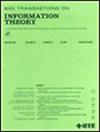Convolution Type of Metaplectic Cohen’s Distribution Time-Frequency Analysis Theory, Method and Technology
IF 2.2
3区 计算机科学
Q3 COMPUTER SCIENCE, INFORMATION SYSTEMS
引用次数: 0
Abstract
The conventional Cohen’s distribution can’t meet the requirement of additive noises jamming signals high-performance denoising under the condition of low signal-to-noise ratio, it is necessary to integrate the metaplectic transform for non-stationary signal fractional domain time-frequency analysis. In this paper, we embark on blending time-frequency operators and coordinate operator fractionizations to formulate the definition of the joint fractionizations metaplectic Wigner distribution (JFMWD), based on which we integrate the generalized metaplectic convolution to address the unified representation issue of the convolution type of metaplectic Cohen’s distribution (CMCD), whose special cases and essential properties are also derived. We blend Wiener filter principle and fractional domain filter mechanism of the metaplectic transform to design the least-squares adaptive filter method in the JFMWD domain, giving birth to the least-squares adaptive filter-based CMCD whose kernel function can be adjusted with the input signal automatically to achieve the minimum mean-square error (MSE) denoising in Wigner distribution domain. We discuss the optimal symplectic matrices selection strategy of the proposed adaptive CMCD through the minimum MSE minimization modeling and solving. Some examples are also carried out to demonstrate that the proposed filtering method outperforms some state-of-the-arts including the classical Gaussian filter, the Cohen’s distribution filtering methods with fixed kernel functions, the classical Wiener filter, the adaptive generalized linear canonical convolution-based filtering method, the adaptive Cohen’s distribution filtering method, the adaptive JFMWD-based Cohen’s distribution filtering method, and the adaptive generalized metaplectic convolution-based Cohen’s distribution filtering method in noise suppression.求助全文
约1分钟内获得全文
求助全文
来源期刊

IEEE Transactions on Information Theory
工程技术-工程:电子与电气
CiteScore
5.70
自引率
20.00%
发文量
514
审稿时长
12 months
期刊介绍:
The IEEE Transactions on Information Theory is a journal that publishes theoretical and experimental papers concerned with the transmission, processing, and utilization of information. The boundaries of acceptable subject matter are intentionally not sharply delimited. Rather, it is hoped that as the focus of research activity changes, a flexible policy will permit this Transactions to follow suit. Current appropriate topics are best reflected by recent Tables of Contents; they are summarized in the titles of editorial areas that appear on the inside front cover.
 求助内容:
求助内容: 应助结果提醒方式:
应助结果提醒方式:


